
© Colin Cross, Going Postal 2025
Before we get into the progress (or otherwise) happening at the small oasis of calm and solitude that is the old greenhouse and the recently constructed raised beds, how about a little “who used which slogan and why” quiz. Slogan 1) “We’re going to slam on the brakes”. Slogan 2) “If something isn’t working, I roll up my sleeves and get on with it”. Slogan 3) “Have a raving Ramadan, a happy Holi and a perfect Paddys’ day”. Slogan 4) “We’re going further and faster to kick start (summat or other)”. Slogan 5) “Those with skin in the game”. Slogan 6) “A once in a generation upgrade”. Slogan 7) “Unleashing the biggest building boom”. Slogan 8) “What a load of buzzword driven, nanty old bollox”.
Answers (not on a postcard) 1, Wes Streeting, 2, Sir Keith, 3, Sir Keith (again), 4, Rachel (Thieves) Reeves, 5, Sir Keith (yet again), 6, “Crazy” Ed Milliband, 7, Angela (Two gaffs) Rayner, 8, Lord Brian Firth of Hougun Manor. I could go on, because they churn this verbal diarrhea out every weekend. It’s mind numbingly tedious to listen to ostensibly serious people delivering pointless buzz word phrases, thought up by a bunch of SPADs in a PR meeting . NHS spending will continue to rise at an alarming rate, rolling up your sleeves, when you’ve never done a days work in your life is performative crap, having a foot in every camp is just embarrassing for a serious politician, we’ll be in a full blown recession by autumn this year, I think he means hundreds more faceless functionaries, an “upgrade” that will see power cuts and eye watering costs and there’s more chance of plaiting fog than getting 1.5 million homes built in 5 years. Bollox indeed.
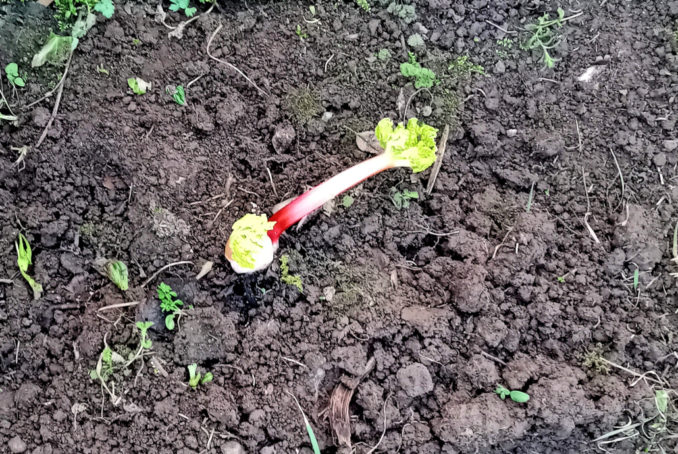
© Colin Cross, Going Postal 2025
I’m not sure we made the right choice to cover the rhubarb, although it was the first winter after planting out. Any road up, it does look reasonably healthy, if a little stunted. Seeing these first new shoots got me thinking, maybe I could “force” one of the crowns in a year or two and create my own little rhubarb corridor? Also, while I’m on the subject, I got to wondering where the word (and the plant) itself came from. Unlike me, I know, because I usually couldn’t care less, but a cursory Google search revealed all. It’s a native of Asia and it’s scientific name is Rhuem rhabararum. That’s that sorted out.
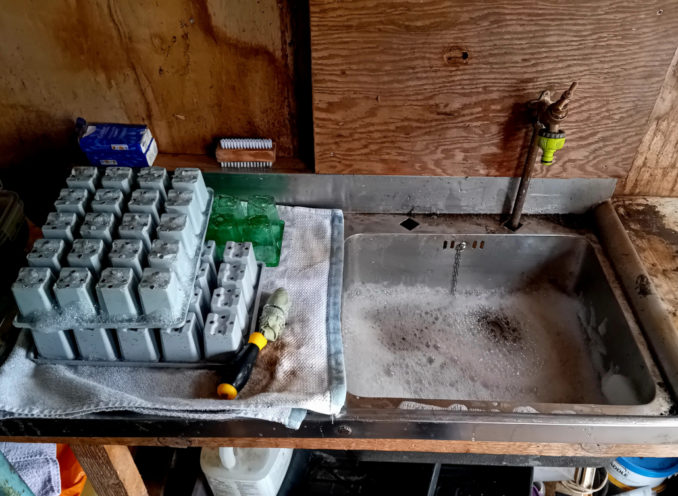
© Colin Cross, Going Postal 2025
It’s that time of year again, when I can either softly bang the last few years bedding plant containers on the workbench, hoping they’re somehow self cleaning, or put the kettle on, squirt a bit of washing up liquid in the sink, yawk up a simple cleaning device and give them the wash they should get every year. I’ve got no idea how many bedding plants Mrs. C has bought over the years, but I must have maybe fifty or so of these types of containers, and they do come in handy for getting things started in the propagators. Mindful of disease and pestilence I’ve given this lot (and more) a birthday, ready for some seed planting over the next week or two. Not the most riveting paragraph you’ll ever read, I know, but us thrifty Yorkshire men like to get full value out of a bit of old plastic, whilst, at the same time, doing our bit to “save the planet”.
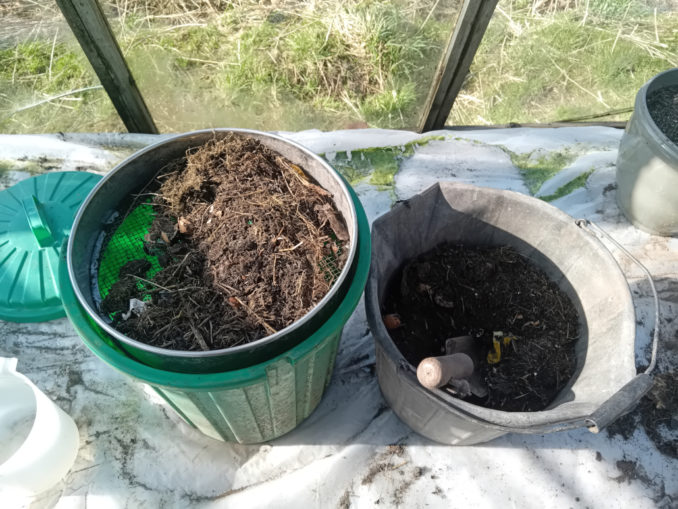
© Colin Cross, Going Postal 2025
I probably had a half-hearted attempt at this last year, although it’s likely (I can’t be bothered to look back that far) that I riddled bought compost to make a finer medium for seed germination. Any road up, my own compost heap’s been going for several years now and I thought it was maybe about time to put it to some use. There’s plenty in it that hasn’t fully broken down, but by getting into the middle of the heap and “mining” a bucket or two of the more rotted down material I’m hoping to not have to buy more than a couple of bags this year. Like everything else, it doesn’t get any less expensive.
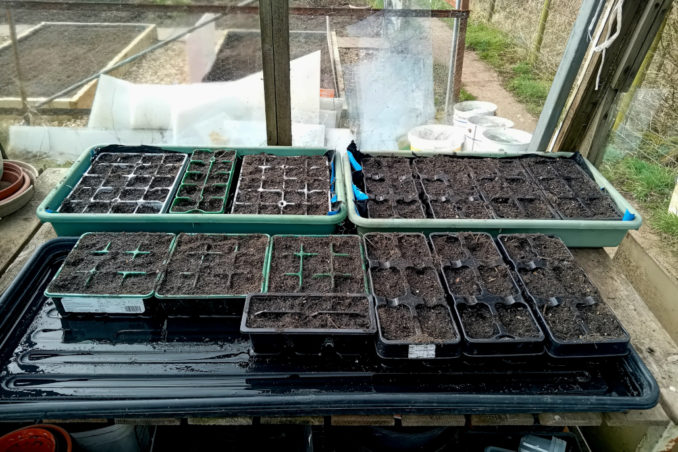
© Colin Cross, Going Postal 2025
I have no idea if I even have 150 seeds that can’t (or won’t) be directly planted, but once I got started I couldn’t contain myself. Interestingly, when I watered these trays a significant number of tiny worms began wriggling to the surface. I’m hoping they’re baby earthworms, rather than parasites, I suppose I’ll find out soon enough. The fifty (top left) are for tomatoes and eighteen of those bottom left are for chilies and peppers. Admittedly it’s a bit of a faff when it comes to potting on, I won’t bother to do this with the capsicums, I’ll harden them off in the cold frame and then plant them directly into the soil, the tomatoes will be another matter, but we’ll cross that bridge when we get to it.
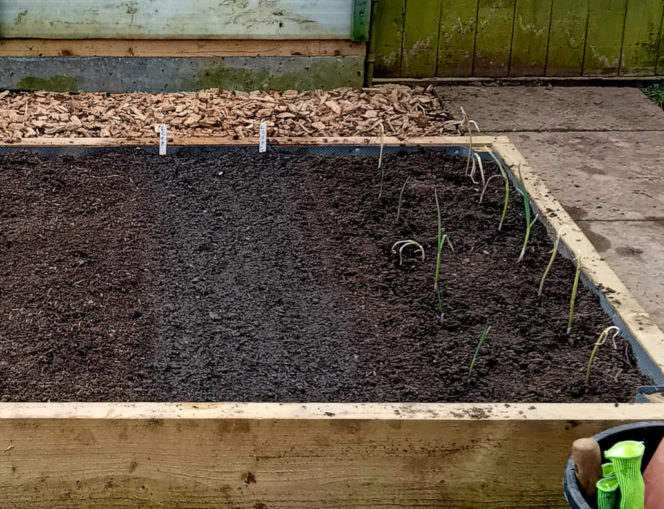
© Colin Cross, Going Postal 2025
I’ve made a start outside by planting out some garlic that’s been in pots in the greenhouse and planting a couple of rows of leeks. I don’t really know if I’ve made the best positioning choice for the edible alliums, but I’m working on the theory that they spend longer in the ground than most edible plants and won’t be too discombobulated by being in the bed that’s the most sheltered from the weather but gets the least amount of sun, especially in the early months and later on in the year. All four beds should get full sunlight for at least three to four hours in the height of summer, so I don’t see it being too much of an issue. Time will tell, if we need to move things around next year, I suppose we will.
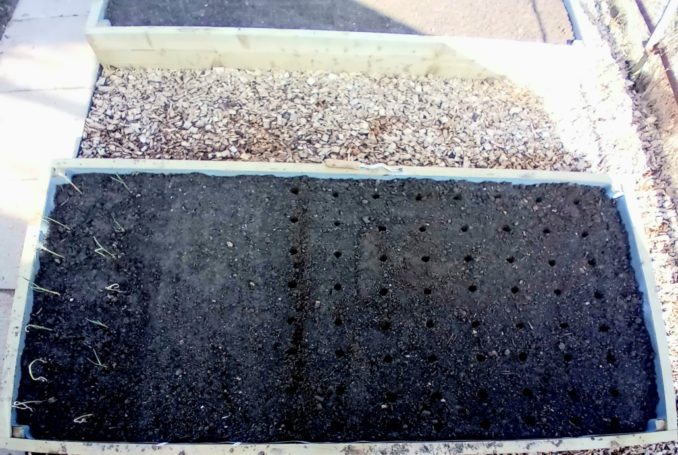
© Colin Cross, Going Postal 2025
This is the same bed, showing the spacing out for the sixty four onion sets (thirty two of each, red and white) I plan to put in there over the coming week or so. I’m a bit wary of frost, you never know up here, but I do have plenty of fleeces I can drape over. I’ve spaced them six inches apart, which should be adequate, although I should be able to harvest smaller ones first, hopefully leaving room for larger ones to grow on. There’s always the village show to consider, especially given that I’ve taken first prize in the “red onions grown from sets” class for the last several years. This is the second time of growing them outside, but the soil’s far better (we hope) than it was last year, so I’m expecting good results although, as we all know, nowt’s certain in the gardening game.
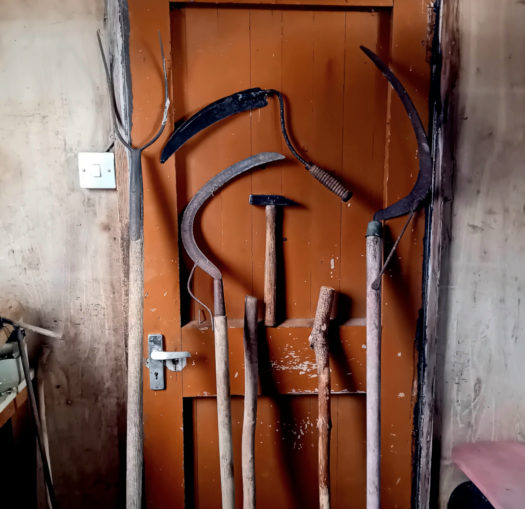
© Colin Cross, Going Postal 2025
Dear Herr Schwamp,
I hope this missive finds you well and that, given your advancing years, you’re not finding the rarefied atmosphere of Davos too challenging. Before I continue, allow me to introduce myself: my name is Colin Cross. I was born into what I would consider the “yeomanry” class of English society, as opposed to either the peasantry or the nobility. I can trace my ancestry back over 500 years. All my forebears (to my knowledge) were Englishmen and women who earned their livings, by mostly utilising artisan skills, although one of my grandmothers was an indentured servant at a grand country house in her early teens. Many of them worked on the land. Now, to the matter at hand. It has come to my attention that the organisation you’ve headed up for a not inconsiderable number of years, (amassing a great fortune along the way) would like to remove the right of free born citizens to grow their own food, in an effort to forestall the advent of something you refer to as “Climate Change”. Most people I know, at least those with a modicum of sanity, who aren’t grifting for a living, refer to it as “a load of old bollox”, but each to their own. Freedom to use ones own land in the way one sees fit is often hard won. Both my parents served their country in the second world war. Three of my great uncles perished in The Great War, fighting for “King and Country”, I doubt they’d do so again, given where we’ve ended up. Growing up I remember how allotments and other small patches of land were utilised by the “common people” to supplement their diets with nutritious vegetable and berries that weren’t always either readily available or affordable. I have a small patch of land, the use of which was gifted to be by another free born English yeoman, on the understanding that I maintain it and use it to grow produce to feed myself and my family and, in times of plenty, to use as barter for those things I don’t produce, such as meats and fruits. I’m sure that if you were to take the time to visit my little plot you’d see that far from it being a threat to the well being of the planet it is exactly the opposite of that. It’s sustainable and it’s cost effective, which makes me wonder what your real motive may be in trying to ban it. It’s all very well wanting to change the world to fit your vision, or to enrich yourself and your confederates beyond the dreams of Croesus, but crackpot ideas can only succeed when sane and grounded men and women refuse to challenge them. I doubt whether you, given your clearly hedonistic tastes and proclivities, wants to live by eating laboratory produced protein, “printed” meat and flavoured insect matter, do you? Maybe you’ve become a little too divorced from the realities of life, given how much time you spend pontificating from your ivory tower, surrounded by sycophantic, greedy and amoral elites, who stroke your ego (and heaven knows what else) for the opportunity to enrich themselves to the detriment of the vast majority of the global population. Accordingly, I again extend an invitation to you and your “friends” to visit this little corner of England to get an idea of how the world really works outside the confines of WEF “blue sky thinking” talking shops and how the tilling of the land brings both joy and sustenance to those simple (but far from stupid) folk who undertake such work. Should you find yourself unimpressed by this simple if rewarding pastime and the prospect of getting your hands dirty a little too “gauche” for your sophisticated tastes, then maybe you and your entourage would be more interested in my collection of well used vintage farm implements (implements the like of which have been used, over millennia, to both work the land and protect it). They’re symbolic of a far simpler time, when working with ones hands, and protecting ones right to do so, wasn’t something to be ashamed of. I look forward to hearing from you in due course;
Yours, Most Sincerely Brian Firth, A Free Born English Yeoman
© Colin Cross 2025



